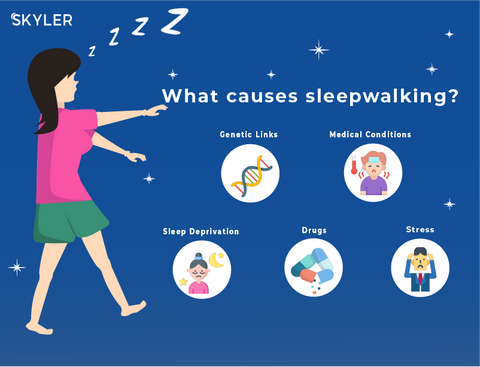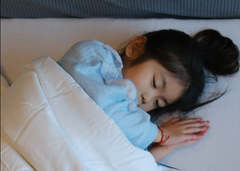Have you ever seen people in your household get up and wander around the house at night while they’re still asleep? They could be one of the 4% of adults that suffer from sleepwalking.

What is sleepwalking?
Sleepwalking, or somnambulism, is a type of sleep disorder which usually happens during deep sleep, or the non-rapid eye movement (NREM) period of sleep. Sleepwalkers get out of bed and move around while they’re asleep. Occasionally, they may even talk or open their eyes, though they may look somewhat glazed or out of focus. They tend to go back to bed on their own but when they wake up, they often won’t remember anything that happened the night before.
Sleepwalking is more common in children, usually between the ages of 4-8 (up to around 15% of children sleepwalk), but most children outgrow the disorder by the age of 12. Children are more likely to experience sleepwalking due to the immature development of their nervous system, and that older people do not experience deep sleep as often as children.
What causes sleepwalking?
There are no clear-cut causes that lead to sleepwalking, but there are several factors that can increase the risk of sleepwalking:
- Genetic links
- Existing medical conditions, such as sleep apnea or seizures
- Sleep deprivation
- Drugs or alcohol
- Stress

Sleepwalking is most likely linked to genetics, stress and the side effects of medication. Other factors such as sleep deprivation can also trigger sleepwalking, while people who suffer from sleep apnea are also more likely to experience this condition as their airways are narrowed as they sleep, which lowers oxygen levels in the brain. The body is then awakened to a semi-conscious state to maintain normal breathing, which can trigger sleepwalking.
Is sleepwalking harmful?
Sleepwalking by itself isn’t harmful, as long as it’s not associated with other underlying medical conditions. When sleepwalkers sleep, part of their brains responsible for consciousness is in a rested state, while the part in charge of limb movements is still active. This leads to actions being performed unconsciously. According to Lam Siu-ping, Honorary Secretary of the Hong Kong Academy of Sleep Medicine, sleepwalkers can perform complex activities such as wandering, cooking or sending messages on a phone. Some people may even be able to jump over railings, climb out of windows or eat raw food that isn’t supposed to be consumed raw, all of which puts the sleepwalker at risk of getting hurt or affecting others.

What should I do if I live with someone who sleepwalks?
You may have heard that waking up sleepwalkers can give them a heart attack. This is a pure myth. However, it’s best not to wake them up as it can shock them and they can become confused or disoriented for a short while after they’ve been woken up. Instead, try to gently guide the sleepwalker safely back to bed. If this doesn’t work, rather than shaking or hitting them, you should try calling their name out loudly or use sharp noises to wake them up.
Tips to prevent sleepwalking
Although there are no specific treatments for sleepwalking, sleepwalkers can create better sleep habits that can help lower the likelihood of developing the condition:
- Stick to a regular sleep schedule, sleep and wake up at the same time every day
- Practise relaxation techniques before bed, such performing simple yoga, drinking a cup of herbal tea, or taking a warm bath
- Limit caffeine intake
- Keep your bedroom quiet, dark and cool
- Invest in a comfortable mattress

Sleepwalking, in its simplest terms, is an uncoordinated sleep response of the brain and limbs. As long as you approach the condition appropriately, there isn’t much to worry about. Most importantly, you should take care of your own physical and mental health, maintain a regular sleep schedule and avoid relying too much on sleep medication to prevent abnormal sleep conditions.




